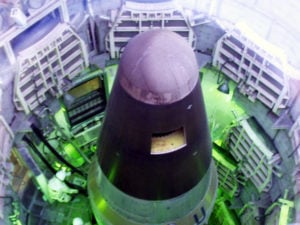
Those attending to Russian politics this week will have noticed that among the stated reasons for Finance Minister Kudrin’s rebellion and dismissal was his unhappiness with high Russian military spending. It’s important, indeed, to keep an eye on Russia’s military buildup and on the increased emphasis the Putin regime has put on nuclear deterrence, as the East-West balance of conventional forces has shifted markedly in favor of the Atlantic Alliance. But the answer to those developments is not higher U.S. military spending or more spending on obsolete nuclear weapons.
Arms Control Association Executive Director Daryl Kimball ably makes the case in a letter in this morning’s New York Times. I quote it here in full:
“The Pentagon Budget and the Deficit” (editorial, Sept. 27) is on target in calling on the Pentagon to ‘sharply prune the tens of billions it spends every year on building new versions of cold war weapons systems ill suited to America’s 21st-century military needs.’ This includes proposals for new nuclear subs and bombers that would cost upward of $100 billion over the coming decades.
“The United States, by rightsizing its operational fleet of Trident nuclear-armed subs to 8 or fewer from 12 and building no more than 8 new nuclear-armed subs, could still deploy the same number of strategic nuclear warheads at sea as is planned (about 1,000) and save roughly $26 billion over 10 years, $31 billion over 30 years, and $120 billion over the life of the program.
“By delaying work on a new long-range penetrating bomber beyond the next 10 years, Congress could save at least $3.7 billion in research and development costs, and if the program were canceled, it would save at least $50 billion in procurement costs alone.
“Because the Pentagon will continue to deploy 60 already proven B-2s and B-52s, delaying the new bomber program would not have any effect on United States nuclear force deployments.
“By responsibly reducing strategic nuclear forces we no longer need and can’t afford, we can help close the budget deficit and reduce Russia’s incentive to maintain a larger nuclear arsenal.”
Other letters, by Vice Admiral Norb Ryan and U.S Senator Bob Casey, take the Time to task for its recommendations concerning military pay and personnel. A fourth letter, by Alicia Godsberg, executive director of Peace Action New York State, echoes and amplifies Kimball’s points:
“The military budget needs to be cut, but your editorial takes aim at the wrong place. Instead of cuts in pay and benefits for our soldiers, cuts should come from the billions spent on nuclear weapons.
“Debate in Washington dismisses [sic?] almost $700 billion in spending over 10 years on nuclear weapons. New nuclear-capable submarines have an estimated price tag of $116 billion, and a new nuclear-capable bomber could cost $3.7 billion.
“Additionally, new nuclear weapon facilities at an estimated $10 billion are on the way. And what for? Nuclear weapons are unable to protect Americans from today’s threats, and President Obama has stated that the United States seeks the peace and security of a world without nuclear weapons.
“The crisis in spending is a crisis of priorities. To cut the pay and benefits of our military would be shameful when wasteful spending on nuclear weapons needs to be cut instead.”